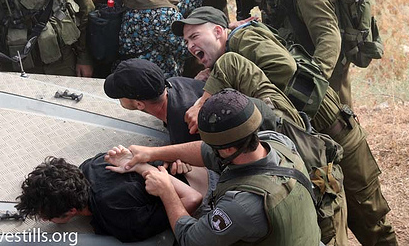Seven-justice panel of Israeli Supreme Court unanimously rejects petition demanding higher education for Palestinian prisoners held in Israeli prisons
On 14 April 2015, the Israeli Supreme Court delivered its final judgment on a petition concerning the right to higher education of Palestinian political prisoners held in Israeli prisons. An expanded panel of seven justices rejected the petition, which was filed by the Haifa University Prisoners' Rights Legal Clinic, Adalah, and the Association for Civil Rights in Israel, and on behalf of three prisoners.
The majority of justices argued for a sweeping prohibition on higher education. Former President of the Supreme Court, Asher Grunis, completely rejected the petitioner’s arguments, and opposed the suggestion of current Supreme Court President Naor, for the court to make decisions on prisoner’s education on an individual, case-by-case basis. Grunis claimed that there is a legal and legitimate distinction between criminal prisoners and security prisoners, and that denying education to security prisoners is both proportionate and reasonable. He added that funding for higher education in prisons is already a suspect issue, and it would be difficult to determine whether funding is coming from the individual or the “terrorist organization.”
The current President of the Supreme Court, Miriam Naor, in a minority opinion joined by Salim Jubran and Esther Hayut, emphasized that the Israel Prison Service (IPS) cannot impose restrictions on prisoners arbitrarily, and that any IPS decision must be proportional and reasonable. She added that the previous government's decisions acknowledged that it is possible to treat "security prisoners" (as so designated by the IPS) and criminal prisoners differently with respect to prison conditions, but only in cases where this restriction is objectively required for security needs or to impose order in the prisons. Justice Naor also wrote that even if a prisoner was convicted of security-related charges, it was not a sufficient reason to unjustifiably deny the prisoners' rights or privileges. She suggested that it might be reasonable to request that the IPS establish a mechanism to examine the funding individually for each prisoner.
Following the Court's decision, Attorney Abeer Baker of the Haifa University Prisoners' Rights Legal Clinic, Adalah and ACRI, commented: "The Supreme Court's decision allows the government to continue preventing the higher education of prisoners classified as "security prisoners,” even though the decision is not related to security considerations, other than an act of revenge to pressure Hamas, while Israel soldier Gilad Shalit remained in captivity. There is no relationship between the education of prisoners and the security of the State of Israel, especially since prisoners have been enrolled at the Open University for over 20 years. This decision establishes a special regime in the prison that allows arbitrary and abusive practices against Palestinian prisoners because they are Palestinians, and is not without risk due to the extent of relationship with them."
The Court's decision comes after four years of deliberations in the District Court and the Supreme Court. The last legal motion was filed in 2013, in which Attorney Abeer Baker of the HU Prisoners’ Rights Legal Clinic, Adalah Attorney Hassan Jabareen and ACRI Attorney Lila Margalit, on behalf of three prisoners, asked the Court to reconsider its 2012 decision, which rejected prisoners' appeals to continue their education via the Open University during their sentences in Israeli prison. The Israeli government has prevented prisoners from pursuing their higher education since June 2011 as a punitive, retaliatory measure to pressure Hamas to release Gilad Shalit. According to the court's decision, the prevention of university education does not constitute unacceptable discrimination between security and criminal prisoners, and it rejected the petition without further explanation.
Case Citation: Additional Hearing in HCJ 204/13, Said Salah et al v. Israel Prison Service (decision delivered 14 April 2015)
Read the decision in Hebrew: here
For more information, see:
Adalah Press Release, "Palestinian Prisoners Seek Reconsideration of Supreme Court Ruling Upholding Ban on Higher Education," 8 January 2013

















